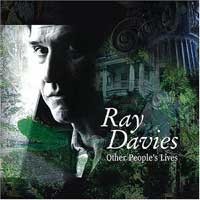
Ray Davies
Other People’s Lives
(V2)
[
{
"name": "Air - MedRect Combo - Inline Content 1",
"component": "11490391",
"insertPoint": "3",
"requiredCountToDisplay": "1",
"parentWrapperClass": "fdn-ads-inline-content-block"
},{
"name": "Air - MedRect Combo - Inline Content 2",
"component": "11490392",
"insertPoint": "7",
"requiredCountToDisplay": "5",
"parentWrapperClass": "fdn-ads-inline-content-block"
},{
"name": "Air - MedRect Combo - Inline Content 3",
"component": "11490393",
"insertPoint": "12",
"requiredCountToDisplay": "9",
"parentWrapperClass": "fdn-ads-inline-content-block"
}
]
Ray Davies
Other People’s Lives
(V2)
Of all the aging veterans of the
’60s British Invasion, Ray Davies has held up the best. Sure,
Mick has harder abs and Sir Paul a fatter wallet, but the former
Kinks frontman has something far more important: his dignity. He
doesn’t need to strut around in hip-huggers or simper
obligingly at his Grammy bud Jay-Z because — sound the
trumpets! — he can still write songs. The man who gave us
“Waterloo Sunset,” “Shangri-La,”
“Oklahoma, U.S.A.,” “Victoria,” and
countless other works of unadulterated brilliance remains a vital
creative force, his genius undimmed by the decades. He might not
have the mass cachet of his richer and more media-savvy peers, but
he has much less to answer for.
If you don’t count 1998’s The Storyteller, which
featured new versions of Kinks songs amid spoken-word monologues, Other People’s Lives is Davies’s first solo album, and it’s
a triumph through and through. The opening track, “Things Are
Gonna Change (The Morning After),” a noisy anthem with
squealing guitars and a killer bridge, announces the album’s
theme of qualified optimism: “Get up, you wreck/And crawl out
through the door/Love will return.” It’s a
survivor’s manifesto, as befits a guy who recently endured
the protracted dissolution of his band, his bandmate
brother’s debilitating stroke, a gunshot wound to the leg
during a mugging in his adopted home of New Orleans, and the loss
of said home after Hurricane Katrina.
Other standouts include the caustic but never
self-pitying “All She Wrote,” a breakup ballad
embellished by an unforgettable descending melody; “Creatures
of Little Faith,” a lovely open-hearted paean to human
frailty; “The Getaway (Lonesome Train),” which recalls
the avant-la-lettre alt-country of the Kinks’ landmark Muswell Hillbillies
album; and the improbably funky, impossibly moving “Over My
Head.” Fans of Davies’s humorous character studies
might prefer “Next Door Neighbour,” a vaudevillian
ditty that wouldn’t seem out of place on The Village Green Preservation Society, and “Stand Up Comic,” a crude but very
funny meditation on the redemptive powers of bathos. And
although the flamenco-flavored title track, a somewhat predictable
screed about evil paparazzi, is something of a disappointment,
it’s still a sight better than anything Mick or Paul has written
in the past couple of decades.
Matthew Shipp
One
(Thirsty Ear)
Matthew
Shipp is a pianist and composer whose music is variously described
as free jazz, avant-garde classical, and experimental hip-hop. None
of these terms is inaccurate, exactly, but none begins to convey
the scope and originality of his vision. Sometimes Shipp’s
music suggests a kind of deconstructed riff on
turn-of-the-previous-century impressionism, evoking the watery
lyricism of Claude Debussy, the voluptuous Orientalism of Maurice
Ravel, the spidery proto-minimalism of Erik Satie. Sometimes it
sounds like a natural offshoot of Cecil Taylor’s knotty
conundrums or Thelonious Monk’s ravishing post-bop
études. Depending on your frame of reference, you might
detect traces of other important forebears, but rest assured: These
influences are so smoothly assimilated, so thoroughly distilled by
Shipp’s own offbeat genius, that the resultant compositions
sound as original as one could reasonably expect in our
post-postmodern age.
If one thing is certain about Shipp’s
music, it’s this: It’s very beautiful, but it
doesn’t yield its pleasures immediately. Long legato runs
surrender to sharp, brittle triads, and luminous melodies subside
in abstract cogitations. At times, it seems willfully, perversely
cerebral; at others, unfashionably Romantic. One, Shipp’s third
solo outing, might consist entirely of acoustic piano, but
it’s no less experimental than his recent cross-pollinations
of outside jazz and turntablism. From the rumbling, reverberant
excursions of “Arc” to the dense chromatic clusters of
“Patmos” and the cascading, atonal patterns of
“Module,” One is a spectacular union of pianistic technique and
compositional ingenuity.
Illinois Times has provided readers with independent journalism for almost 50 years, from news and politics to arts and culture.
Your support will help cover the costs of editorial content published each week. Without local news organizations, we would be less informed about the issues that affect our community..
Click here to show your support for community journalism.
